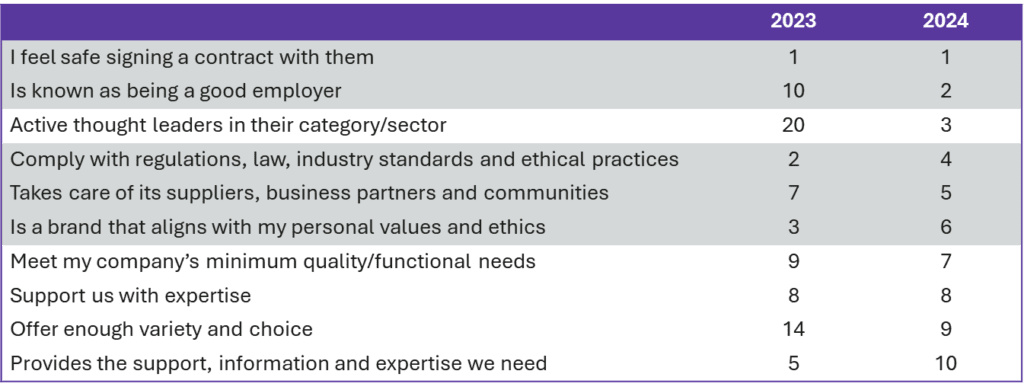If corporate citizenship is not sufficient motivation, there is a clear commercial incentive for embracing Environmental, Social and Governance (ESG) principles: government and corporate contracts.
New research by global media agency Dentsu reveals ESG factors now represent 5 of the Top 10 decision drivers for B2B buyers.
Dentsu conducts an annual study (the B2B Superpowers Index) of B2B buying behaviour across the professional services, financial services, manufacturing and technology sectors.
The 2024 research found that an organisation’s reputation, compliance, ethics and values are among the most important decision drivers for B2B buyers.

Each of these drivers aligns with one or more of the ESG pillars. Here’s how:
Decision Driver #1: I feel safe signing a contract with them
ESG performance influences risk perception. Companies with strong governance and transparent environmental and social practices build trust. Buyers feel more secure entering contracts with businesses that operate ethically, follow sustainable practices, and mitigate risks such as regulatory breaches or reputational damage, which are often tied to poor ESG performance.
Decision Driver #2: Is known as being a good employer
A company’s treatment of its workforce is key to the ‘Social’ aspect of ESG. Businesses known for being good employers are seen as fostering strong internal cultures, treating employees fairly, and providing supportive work environments. This focus on social responsibility builds trust, signalling to B2B buyers that they are partnering with a company that values human capital, leading to better long-term performance and stability.
Decision Driver #3: Comply with regulations, law, industry standards and ethical practices
Compliance with laws and regulations is the bedrock of good governance. ESG frameworks push companies to meet legal requirements and adhere to ethical standards and industry best practices. This reassures buyers that the business is forward-thinking, proactive in risk management, and less likely to face disruption due to legal or ethical issues.
Decision Driver #4: Takes care of its suppliers, business partners and communities
Responsible supply chain management and community engagement are key components of a strong ESG strategy. Companies that care for their partners and communities demonstrate a commitment to social responsibility, fostering long-term, mutually beneficial relationships. Buyers see this as a sign of stability and ethical alignment.
Decision Driver #5: Is a brand that aligns with my personal values and ethics
ESG practices allow companies to align with buyers’ personal values, particularly in areas like sustainability, diversity, and ethical governance. As B2B buyers increasingly look for partners that reflect their own commitment to ESG, brands that demonstrate this alignment build deeper trust and stronger connections.
Strategic procurement leads the way
We’ve seen the impact of ESG on business development through strategic procurement for some time. Every request for tender now includes ESG related questions–questions which are not only increasing in number but also in sophistication.
Government and corporate procurement teams are demanding specific, data-backed responses to questions about everything from Indigenous engagement and carbon emissions reduction to closing of the gender pay gap and mitigating modern slavery risk.
In engineering and major infrastructure bids, tendering organisations are also increasingly required to declare what ESG-related targets and activities—such as First Nations identified roles or spending with SMEs and local businesses—they will commit to for the term of the contract, should they be successful.
This leaves no room for ESG-washing. Businesses seeking to win, grow and defend government and corporate accounts must ensure their claimed commitment to environmental, social and governance issues is authentic. Aligning words with action will build brand and reputation which, with all else being equal, will lead to revenue growth and client retention.






